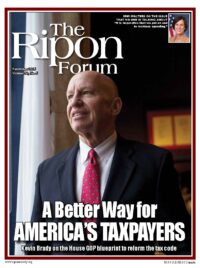
Following Hurricane Matthew and the recent flooding in Louisiana, the mainstream media parroted talking points of radical environmentalists claiming these events prove that human-caused climate change is causing extreme weather. Nothing could be further from the truth.
In multiple reports, the U.N. Intergovernmental Panel on Climate Change has said rising carbon-dioxide levels will cause an increase in the strength and longevity of hurricanes, which are ranked in five categories based on wind speed, with Category 5 – sustained winds of more than 156 miles per hour – being the strongest.
While carbon-dioxide levels have risen over the past decade, Matthew was the first Category 5 hurricane to form in the Atlantic Basin since 2007, marking the second-longest period between the formations of Category 5 hurricanes in the Atlantic Basin. It is notable that Hurricane Matthew only topped Category 5 wind speeds for six hours, tying it for the shortest-lived Category 5 hurricane on record. The record for the longest sustained Category 5 hurricane came in 1932 when for 78 hours Hurricane Cuba wreaked havoc on the region, long before concerns about human-caused climate change arose.
Matthew was only a Category 1 hurricane when it reached the mainland United States. Thus, it has been 4,019 days since the last Category 3 or above hurricane made landfall in the United States – an ever-increasing record for the number of consecutive days between major hurricanes striking the U.S. mainland.
Concerning rainfall, multiple studies in 2016 find no evidence rainfall amounts or severity have increased in recent years. For instance, a recent American Meteorological Society report examining rain data found “no evidence … for changes in extreme precipitation attributable to climate change in the available observed record.”
Multiple studies in 2016 find no evidence rainfall amounts or severity have increased in recent years.
Authors of a paper in the August 2016 edition of the journal Theoretical and Applied Climatology found “stronger storms are not getting stronger.” The authors also found any changes in the strength, seasonality, and even the increase in the number of heavy rainfall events could be explained by natural variability of the Atlantic and Pacific Oceans.
Concerning drought, researchers have found no increase in the frequency or severity of droughts in the United States since 1900. Indeed, proxy data indicate mega-droughts, which can last 200 or even more than 1,000 years, have occurred throughout history across the Western United States. The United States has yet to experience anything remotely close to such events for centuries. Even the highly destructive dust bowl of the 1930s lasted only eight years.
The Obama administration has proposed a number of initiatives to fight climate change, which it says it can accomplish by slashing greenhouse-gas emissions by curbing fossil-fuel use.
The administration’s biggest climate push is the Environmental Protection Agency’s (EPA) Clean Power Plan (CPP), which mandates a 32 percent reduction in emissions from new and existing coal-fired power plants below 2005 levels by 2030. The Energy Information Administration estimated a draft version of CPP, which only requires a 28 percent reduction in emissions, would result in up to $1.23 trillion in lost GDP (in 2014 dollars) by 2030, with an average annual GDP loss of $112 billion. An analysis by NERA Economic Consulting of the final plan estimates consumers in 40 states could see double-digit electricity price increases due to CPP. In 28 of 40 of those states, consumers will face electricity price spikes greater than 20 percent.
All this harm does not help the environment since EPA has testified CPP will reduce global temperature by less than one one-hundredth of 1 degree Celsius by the year 2100.
Fossil fuel use is not causing weather extremes, but federal policies, including subsidized flood and hurricane insurance, have contributed to rising disaster costs.
Fossil fuel use is not causing weather extremes, but federal policies, including subsidized flood and hurricane insurance, have contributed to rising disaster costs.
Government-subsidized disaster insurance encourages people to build homes where they otherwise would not. The National Flood Insurance Program (NFIP) does not require homeowners whose homes are damaged or destroyed by floods, even repeatedly, to relocate. Since 1984, NFIP has paid out more than $1 billion for least 10,000 properties experiencing two or more losses.
Despite the National Climactic Data Center saying increased population and development of coastal areas is responsible for the higher losses from hurricanes and flooding, NFIP encourages people to relocate to the coasts. According to the 2000 U.S. Census, half of Americans live within 50 miles of a coast, and by 2025, it estimates 75 percent will. This is especially important because according to the Heinz Center, absent government subsidized flood and hurricane insurance, development in areas that have a high risk of flooding would be about 25 percent less than in low-risk areas.
Ending government insurance programs that perversely encourage people to build homes, hotels, and luxury resorts in disaster-prone areas will do far more to prevent harm from natural disasters than the Obama administration’s efforts to end the use of coal, natural gas, and oil.
H. Sterling Burnett, Ph.D. (hburnett@heartland.org) is a research fellow on energy and the environment at The Heartland Institute, a nonpartisan, nonprofit research center headquartered in Arlington Heights, Illinois.




